 Petzlover
Petzlover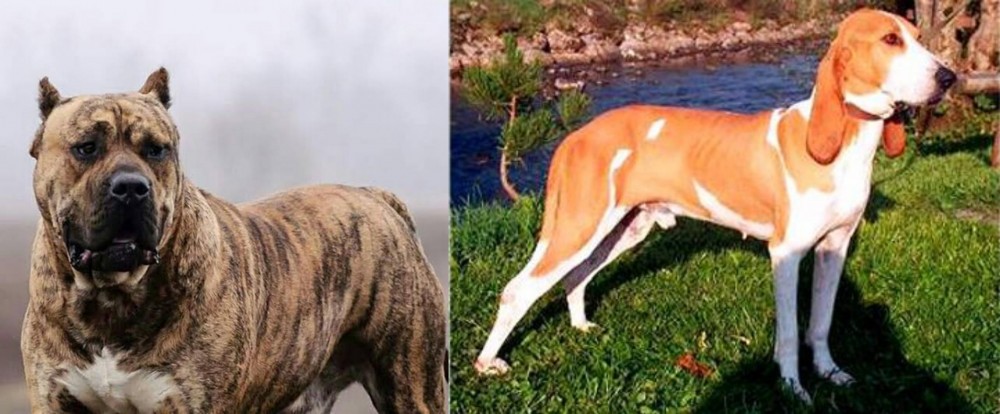 Perro de Presa Canario is originated from Spain but Schweizer Laufhund is originated from Switzerland. Perro de Presa Canario may grow 7 cm / 3 inches higher than Schweizer Laufhund. Perro de Presa Canario may weigh 50 kg / 111 pounds more than Schweizer Laufhund. Both Perro de Presa Canario and Schweizer Laufhund has same life span. Perro de Presa Canario may have more litter size than Schweizer Laufhund. Both Perro de Presa Canario and Schweizer Laufhund requires Low Maintenance.
Perro de Presa Canario is originated from Spain but Schweizer Laufhund is originated from Switzerland. Perro de Presa Canario may grow 7 cm / 3 inches higher than Schweizer Laufhund. Perro de Presa Canario may weigh 50 kg / 111 pounds more than Schweizer Laufhund. Both Perro de Presa Canario and Schweizer Laufhund has same life span. Perro de Presa Canario may have more litter size than Schweizer Laufhund. Both Perro de Presa Canario and Schweizer Laufhund requires Low Maintenance.
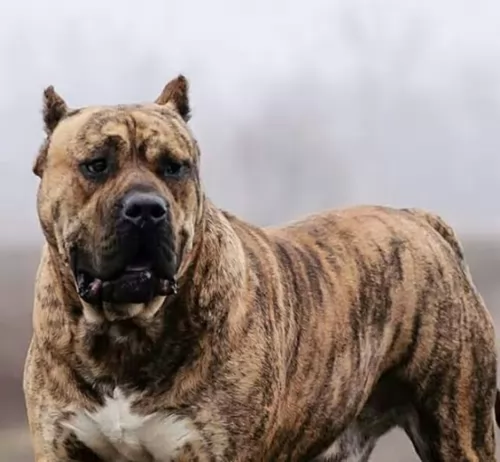 This large dog, also known as the Canary Mastiff, is a rare Molosser-type dog hailing from the Canary Islands.
This large dog, also known as the Canary Mastiff, is a rare Molosser-type dog hailing from the Canary Islands.
It does appear as if, according to records, that these dogs were also consumed at one time. The dog has also been used as a cattle dog as well as being used for dog fighting till the middle of the 1900s. Dog fighting was prohibited in the 1940s but it continued for a number of decades.
As people became interested in other dog breeds, the Presa nearly died out but some breeders revived the breed because of it having some good characteristics – territorial, brave, protective and intelligent. The FCI recognized the dog in 2011.
 The Schweizer Laufhund is a breed born in Switzerland and sought after by the French and the Italians for their skill at hunting small mammals, especially hare. Mercenaries brought scent hounds from France to Switzerland and cross bred them with the Schweizer Laufhund, thereby influencing and changing the native breed.
The Schweizer Laufhund is a breed born in Switzerland and sought after by the French and the Italians for their skill at hunting small mammals, especially hare. Mercenaries brought scent hounds from France to Switzerland and cross bred them with the Schweizer Laufhund, thereby influencing and changing the native breed.
In 1882 it was established that within the breed of “Swiss Hound” (Schweizer Laufhund) there were five different varieties. At this time a standard was written for each of these five different types. By 1909 the standards were revisited and revised, eliminating the hound of Thurgovie. Then in 1933 it was decided that one standard would cover all the varieties of the Schweizer Laufhund.
The Schweizer Laufhund was a line used to develop many different scent hounds. They are used almost exclusively as hunting dogs and not as family companion dogs. St. Hubert Jura Hound, the rare ancient variety, is still in the hunting parties of Canada and France. The breed existed before any dog breeding written records were kept. In Switzerland from the middle ages on, the Schweizer Laufhund was the only hunting dog in the country until recent times.
Even though they didn’t have any popularity until the European nobility became enamored of them in the middle ages, it is thought by some that they date back to the Roman Empire. In actuality most of their pre- Swiss history has been lost. We do know that through the years the breed has been influenced by cross breeding with Austrian, German and French scent hounds.
He is not recognized by the larger kennel clubs such as AKC or UKC, but by some rare breed associations. The dogs that remain today in the United States, Canada and Europe are still mainly owned by either active or retired hunters. Despite their great personalities, they are still not numerous among family pets.
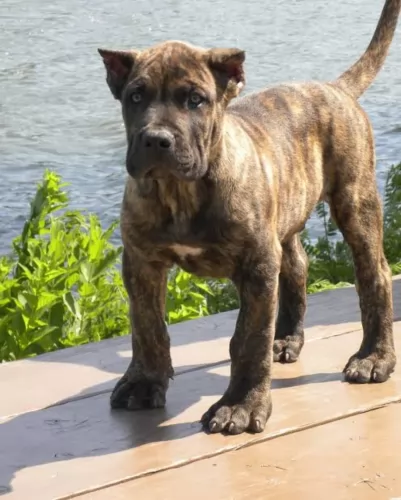 The Perro de Presa Canario or Canary Dog is large and muscular. He stands at 58 to 66cm in height and weighs anything from 40 – 70kg. He has a deep bark.
The Perro de Presa Canario or Canary Dog is large and muscular. He stands at 58 to 66cm in height and weighs anything from 40 – 70kg. He has a deep bark.
The head is broad and the ears are normally cropped to give him a more aggressive appearance. With ear cropping being banned the ears are close fitting to the head and are floppy. This is one of those dogs where the rear of the dog is slightly higher than the shoulders.
The coat is short and there is no undercoating. It is available in all different shades of fawn and brindle. The breed standard requires the dog having a black mask.
Canine experts tell us that this large working dog has got such fearless guardian characteristics that they wouldn’t recommend this dog for first time dog owners. On the other hand however, there are dog owners who claim that with good socialization, this dog becomes docile and amicable around their human family.
He is a clever dog so training and socialization will be easy and it will be worth it. This is a dog noted for its strength, it’s strong personality and potential for aggression, so training and socialization will be most important.
 A medium sized dog with good endurance and strength. Its head is lean, and its muzzle is long making this a very noble looking breed. Each of the 5 varieties has some of its own characteristics. They all have short, fine hairs on their ears and heads and longer hairs on their legs and back.
A medium sized dog with good endurance and strength. Its head is lean, and its muzzle is long making this a very noble looking breed. Each of the 5 varieties has some of its own characteristics. They all have short, fine hairs on their ears and heads and longer hairs on their legs and back.
• Bernese – White with a black saddle or black patches and tan on the ears and face.
• Lucernese – Because they have white and black hair mixed across their bodies, they appear to be “blue”.
The Schweizer Laufhund come in miniature and standard sizes fitting into the same standard. Weight has a lot to do with the gender and height of the individual dog, they are longer than they are tall. As a scent hound, the breed is muscular and sturdy. They carry their long tails in a slight curve with a taper at the end.
Despite the different colors in the different varieties all of the breed have black noses, long droopy ears, and oval, brown eyes. They have a soft, calm and gentle facial expression.
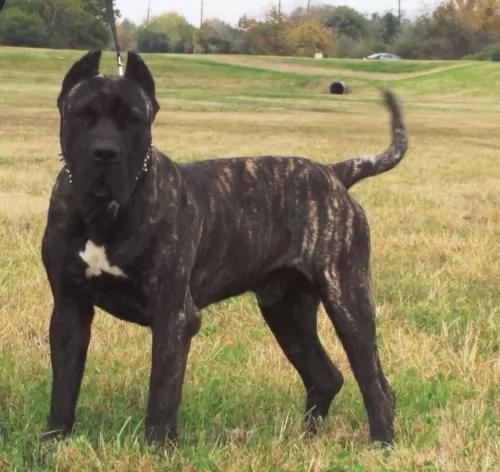 Contrary to what many people think, the Perro de Presa Canario can be a calm, gentle dog when trained and socialized properly.
Contrary to what many people think, the Perro de Presa Canario can be a calm, gentle dog when trained and socialized properly.
It is only when you bring an older, unknown dog into your midst that you would have to exercise caution with him as he can then be aggressive.
Dogs become dangerous and aggressive when they are brought up by aggressive, uncaring people. Humans are always to blame for the way a dog turns out. Provide this large dog with a loving, caring home, and he’ll show you what a remarkable pet he can be.
 1Children friendliness - they can be very gentle and loving with children. Toddlers might remind them of prey, however.
1Children friendliness - they can be very gentle and loving with children. Toddlers might remind them of prey, however.
4.Learning ability -their learning ability is high, but they can be very stubborn.
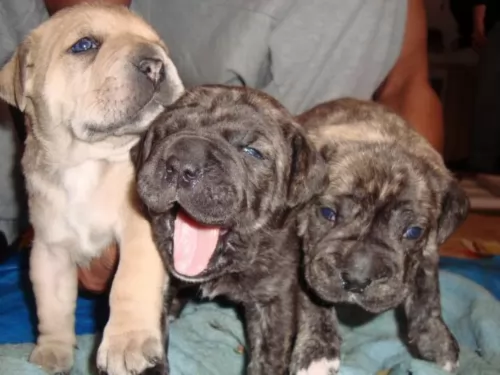 The Perro de Presa Canario can live to be between 8 and 12 years of age. Being a large breed the dog can be susceptible to hip dysplasia and other problems such as cancer and heart problems. It is highly unlikely that a well cared for dog will get any of these illnesses.
The Perro de Presa Canario can live to be between 8 and 12 years of age. Being a large breed the dog can be susceptible to hip dysplasia and other problems such as cancer and heart problems. It is highly unlikely that a well cared for dog will get any of these illnesses.
It is far better to give your dog two smaller meals a day as opposed to one bigger meal as then he tends to wolf his food down. This can lead to bloat, where the stomach swells up and worse, it twists. This dangerous situation prevents fluid and air from escaping the stomach. Your dog is restless, he paces and salivates, wanting to vomit. Bloat can affect any dog at any age.
Kidney disease can develop because of some other illness or it can develop on its own. It can even be caused by bad teeth when bacteria enters the bloodstream of the dog.
 There are a few health issues that the Schweizer Laufhund is prone to. As an ancient breed there is not a lot of genetic evidence of breed health issues but there is more recent reporting.
There are a few health issues that the Schweizer Laufhund is prone to. As an ancient breed there is not a lot of genetic evidence of breed health issues but there is more recent reporting.
• PRA (Progressive Retinal Atrophy) – hereditary – can result in blindness.
• Ectropion and Entropion – eyelid misalignments either inward or outward. Can be corrected with surgery.
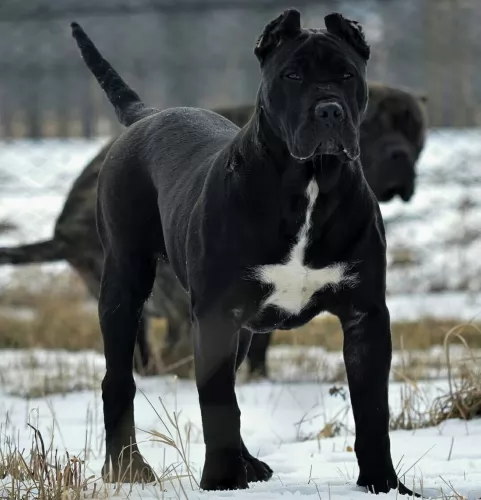 This is a short haired dog, and he isn't a heavy shedder so beyond regular twice-a-week brushing he will simply need to have his eyes and ears checked for infections.
This is a short haired dog, and he isn't a heavy shedder so beyond regular twice-a-week brushing he will simply need to have his eyes and ears checked for infections.
He will also need to have his nails clipped and to check his teeth over too. A sore, bad tooth at the back of your pet’s mouth can cause terrible pain but also play havoc with his general health.
Your Perro de Presa Canario is a high-energy dog and he will need daily exercise. He will love a good walk but he will also need something more strenuous and demanding such as ball- and rope tug-of-war games.
Try and provide your large pet with a top quality commercially manufactured food – one that is packed with vitamins and minerals instead of colorants preservatives and toxic fillers.
Break the monotony of feeding him only kibble by mixing in some cooked chicken, brown rice, sweet potato, carrots and spinach. Dogs love consistency and simplicity and simple meals like this with some raw meat thrown in occasionally will keep him healthy and happy. Never leave him without a constant supply of fresh, cool water.
 . Feeding the puppy – as an active working breed they should be fed a high quality active or working breed kibble formula.
. Feeding the puppy – as an active working breed they should be fed a high quality active or working breed kibble formula.
2.Feeding the adult - the adult should be fed the same active or working breed formula, only in an adult formulation.
4. Games and Exercises – this active breed does require a lot of daily exercise. Take them on at least one good, quick walk per day and give them a fenced yard to play in. They love hunting training and field trials along with activities like barn hunt. They love to run alongside as you bike or jog.